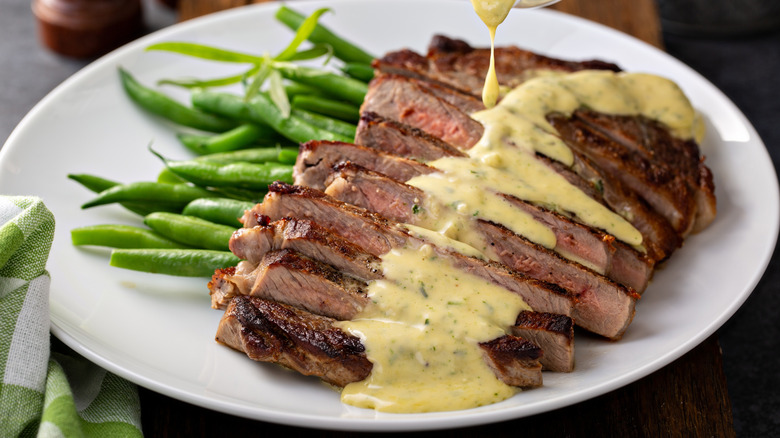Here's How Béarnaise Sauce Got Its Name
French cuisine is known for a lot of things, but it's possible it's best known for its love of sauces. You've probably heard of the concept of French mother sauces, the five (or six, depending on the source) sauces that form the basis of French cooking: veloute, espagnole, tomate, Hollandaise, bechamel, and (possibly) mayonnaise. Generally, other sauces are believed to descend from these, although some have more offspring than others.
One that hasn't produced nearly as many descendants as the others is Hollandaise — but it has at least one sauce that came from it in the form of Béarnaise sauce. But why is it even called Béarnaise? Well, we know why it has that name – it's named after the Béarn region of France. As to how it got the name in the first place, though, that story is a lot more complicated, because while it's named after Béarn, it didn't actually come from Béarn itself.
Béarnaise descended from Hollandaise
In a lot of key ways, Béarnaise is very similar to its parent sauce Hollandaise. Both feature an emulsification of butter and egg yolks along with an acid (lemon juice in the case of Hollandaise, white wine and vinegar in the case of Béarnaise). But Béarnaise involves specifically clarified butter, and seasons with tarragon and shallots, while hollandaise typically only involves pepper.
So then how do we know Béarnaise came from Hollandaise? Because Hollandaise has been around a lot longer (hence why it's classified as the mother sauce): the first-known recipe dates from 1758, while all evidence seems to point to the development of Béarnaise in 1836 by a well-known chef named Jules Collinet on the outskirts of Paris. But why did a Parisian chef name his dish after Béarn, a region located in the southwest of the country, nowhere near Paris? Because Collinet named it in honor of one of France's most notable historical figures.
Béarnaise was named in honor of a French king
Henry IV is one of France's most legendary figures, the first king of the House of Bourbon (the long-running dynasty that would still be in charge at the time of the French Revolution). He was also from Béarn. OK, so it makes sense Collinet would decide to name a dish after an important historical figure — but why did he pick Henry specifically?
Because of the location of his restaurant. Collinet was himself from Béarn, and his restaurant was actually located in Henry's former residence. Collinet even called it "Le Pavillon Henri IV." By the way, it's still open, and still operates under the same name.
So there you have it: even though Béarnaise sauce didn't come from Béarn, the guy who invented it did, and he chose to name it in honor of a historical figure connected to his restaurant. Honestly, there are a lot weirder explanations for how certain foods got their names.


